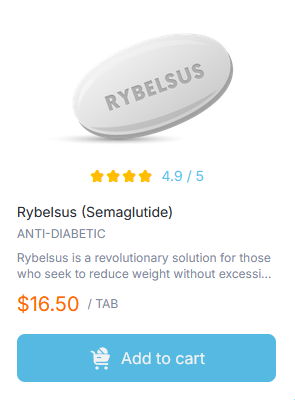Rybelsus and Weight Loss in Non-Diabetic Patients
In recent years, Rybelsus, a medication primarily designed for the treatment of type 2 diabetes, has garnered attention for its potential role in weight management. This interest extends beyond diabetic patients, prompting inquiries into the efficacy of rybelsus weight loss in non-diabetic patients.
Understanding Rybelsus
Rybelsus (semaglutide) is a glucagon-like peptide-1 (GLP-1) receptor agonist that helps regulate blood sugar levels and promotes insulin secretion. Initially approved for managing diabetes, it has shown promise in aiding weight loss due to its appetite-suppressing effects.
The Mechanism of Action
Rybelsus operates by mimicking the action of GLP-1, a hormone that plays a crucial role in glucose metabolism. It slows gastric emptying, leading to reduced hunger and increased feelings of fullness. This mechanism not only benefits individuals with diabetes but may also assist those without the condition in achieving their weight loss goals.
Clinical Studies and Findings
Several studies have examined the impact of Rybelsus on weight loss in non-diabetic populations. Research indicates that participants who were not diagnosed with diabetes experienced significant reductions in body weight when using the medication alongside lifestyle modifications. These findings suggest that Rybelsus could be an effective option for non-diabetic individuals struggling with obesity or overweight issues.
Potential Benefits and Considerations
The prospect of rybelsus weight loss in non-diabetic patients brings various potential benefits:
- Effective Weight Management: Participants often report noticeable weight loss over time, contributing to improved overall health.
- Enhanced Metabolic Health: Weight reduction can lead to better metabolic profiles, lowering the risk of future health complications.
- Support in Behavioral Changes: The appetite regulation provided by Rybelsus may aid individuals in adopting healthier eating habits.
However, it’s essential for potential users to consult healthcare providers before initiating treatment. As with any medication, Rybelsus may come with side effects and risks that need thorough evaluation.
Conclusion
The exploration of rybelsus weight loss in non-diabetic patients represents a promising avenue in obesity management. While results indicate positive outcomes, further research is necessary to fully understand the implications and long-term effects of Rybelsus usage outside its primary indication for diabetes. Individuals considering this medication should engage in open discussions with healthcare professionals to determine the best course of action tailored to their health needs.
Efficacy of Rybelsus for Weight Management in Non-Diabetic Individuals
Rybelsus, a prescription medication primarily used to manage type 2 diabetes, has garnered attention for its potential efficacy in promoting weight loss, even among non-diabetic individuals. The active ingredient, semaglutide, belongs to a class of drugs known as GLP-1 receptor agonists, which have been shown to influence appetite regulation and energy expenditure.
Understanding Rybelsus and Its Mechanism
Rybelsus works by mimicking the effects of the glucagon-like peptide-1 (GLP-1), a hormone that plays a crucial role in glucose metabolism. By activating GLP-1 receptors in the brain, Rybelsus enhances feelings of satiety, thereby reducing overall food intake. This mechanism is particularly beneficial for those looking to manage their weight.
Research on Rybelsus Weight Loss in Non-Diabetic Patients
Recent studies have begun to explore the effects of Rybelsus weight loss in non-diabetic patients. Clinical trials have demonstrated that participants using Rybelsus experienced significant reductions in body weight compared to those receiving a placebo. In these studies, individuals reported not only a decrease in weight but also improvements in related health markers such as blood pressure and cholesterol levels.
Dosage and Administration
The typical starting dosage of Rybelsus for weight management is lower than that prescribed for glycemic control in diabetic patients. This careful titration helps minimize side effects while still achieving weight loss goals. It’s essential for individuals considering Rybelsus to consult with healthcare professionals to determine the appropriate dosage and assess any potential risks.
Side Effects and Considerations
While Rybelsus is generally well-tolerated, some individuals may experience gastrointestinal side effects such as nausea, diarrhea, or vomiting. These symptoms often lessen over time as the body adjusts to the medication. Additionally, individuals with a history of pancreatitis or certain thyroid conditions should approach Rybelsus with caution.
Long-Term Weight Management Strategies
For non-diabetic individuals seeking to leverage Rybelsus for weight loss, it is important to integrate this medication into a holistic weight management plan. This includes adopting a balanced diet, engaging in regular physical activity, and fostering healthy lifestyle habits. Rybelsus can be a valuable tool, but sustainable weight loss typically requires comprehensive lifestyle changes.
Conclusion
As research continues to unfold, the efficacy of Rybelsus for weight management in non-diabetic individuals shows promise. With its ability to promote weight loss through appetite regulation, Rybelsus may provide an effective option for those struggling with obesity or overweight issues. However, like any medication, it should be used responsibly and under the guidance of a healthcare professional to ensure safety and optimal results.
Exploring Rybelsus for Weight Management in Non-Diabetic Individuals
Understanding Rybelsus
Rybelsus, generically known as semaglutide, is primarily used in the treatment of type 2 diabetes. However, recent studies have explored its potential applications for weight management in non-diabetic individuals. This article delves into the effects of Rybelsus on weight loss in non-diabetic patients and how it works.
How Rybelsus Works
Rybelsus functions as a glucagon-like peptide-1 (GLP-1) receptor agonist, which mimics the effects of the GLP-1 hormone that regulates appetite and insulin secretion. By enhancing feelings of fullness and reducing hunger, Rybelsus can contribute to weight loss.
Benefits of Rybelsus for Weight Loss in Non-Diabetic Patients
- Appetite Suppression: Rybelsus helps control cravings and reduces overall food intake.
- Increased Satiety: Users often report feeling full after smaller meals, leading to reduced calorie consumption.
- Enhanced Metabolic Rate: The medication may boost metabolic processes, aiding in weight loss.
- Improved Blood Sugar Levels: Although not diabetic, maintaining healthy blood sugar levels can support weight management.
Clinical Studies and Results
Research has indicated that non-diabetic individuals using Rybelsus for weight loss have observed significant reductions in body weight compared to those not using the medication. In clinical trials, participants showed an average weight loss ranging from 5% to 10% of their initial body weight over a specified period.
Potential Side Effects
While Rybelsus can be effective, it is important to note potential side effects, which may include:
- Nausea
- Diarrhea
- Vomiting
- Abdominal pain
Consulting with a healthcare provider is essential to assess risks and benefits before starting Rybelsus for weight loss.
FAQs about Rybelsus Weight Loss in Non-Diabetic Patients
1. Is Rybelsus approved for weight loss in non-diabetic individuals?
Currently, Rybelsus is primarily approved for diabetes management. However, off-label use for weight loss is under investigation.
2. How long does it take to see results with Rybelsus?
Individuals may start noticing weight loss within a few weeks, but optimal results are usually seen after several months of consistent use.
3. Can anyone use Rybelsus for weight management?
No, it’s important to consult a healthcare professional to determine eligibility based on health history and individual needs.
4. Should Rybelsus be combined with diet and exercise?
For best results, combining Rybelsus with a balanced diet and regular exercise is recommended.
Conclusion
Rybelsus holds promise for weight management in non-diabetic individuals through its appetite-regulating properties. As research continues, understanding its efficacy and safety will help more people make informed decisions about using this medication for weight loss.

